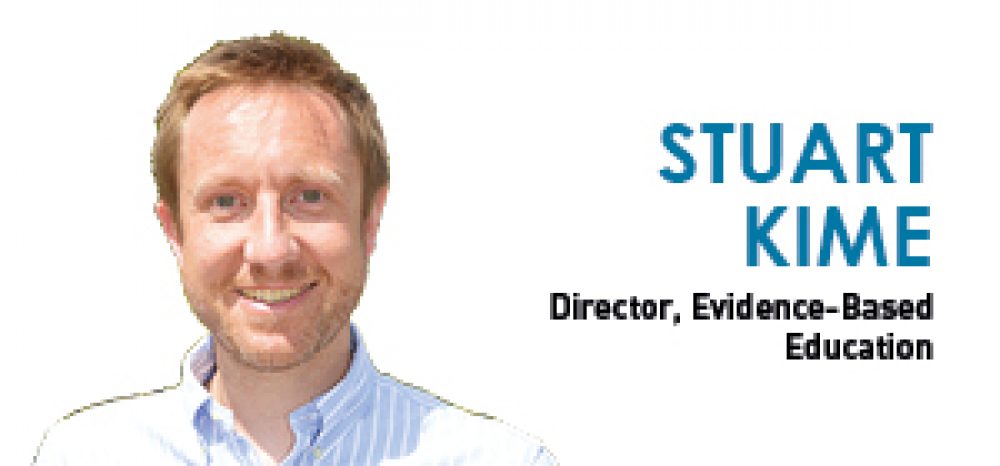Stuart Kime carefully picks out his favourite pieces of research for 2016. He enjoys them all, but the publishers of academic journals and the funding streams of higher education leave him with a bitter taste.
My experience of reading education research is similar to my experience of eating Quality Street: the Purple Ones are things of beauty, joys forever, yet the abomination that is the Coconut Éclair (as if calling it an éclair makes it any better) lurks the bottom of the box, promising only fibrous disappointment: the confectioner’s woodchip wallpaper.
Undeterred by the inevitable potential for a coconut chewfest, I now dip my hand into the 2016 selection box of education research delights, and give you: Kime’s Top Five Purple Ones.
1) A big study with big messages
First out of the box is a piece of research by Prof. Christine Merrell and her group from Durham and Nottingham Universities; they gave us A longitudinal study of the association between inattention, hyperactivity and impulsivity and children’s academic attainment at age 11.

This makes the list for two reasons. Firstly, it’s about something really important – the link between inattention, hyperactivity and impulsivity in 5-year-olds and their academic attainment six years later. Secondly – and for a methods geek like me, perhaps most importantly – this is a strong study with a massive sample of children (46,369) in 1,812 English primary schools.
The main findings were that inattention at age five, but not hyperactivity, was substantively related to attainment at age 11; impulsivity at the same age showed a weak positive correlation with later attainment.
2) We need to talk about marking
The EEF commissioned a review of the evidence on marking this year: A Marked Improvement?. What did it find? Well, that the evidence on marking is thin, flaky and wholly incommensurate with the burden of responsibility it bears. Does this mean we should bin marking altogether? Absolutely not. It means we need to know more about effective marking.

Hot on the heels of the DfE’s workload challenge, the EEF has raised the bar for evidence in this important area; the NCTL’s recent grants for small-scale research on marking (and other areas) are just one way in which the tide of research engagement appears to be turning from the esoteric to the pragmatic. Finally, and if all that weren’t sufficient, Ofsted’s latest ‘School inspection update’ cites the EEF’s report in its message to inspectors, urging them not to report on marking practice until better evidence on its impact is available.
3) What works in primary schools?
I’ve long admired both the delicate beauty and brute force of Stephen Gorard’s work. In alliance with Beng Huat See and Rebecca Morris, Gorard has attended to a growing need by writing clearly about the most effective approaches to teaching in primary schools, in a book usefully entitled The most effective approaches to teaching in primary schools: rigorous evidence on effective teaching (Gorard is a vocal critic of academic nonsense jargon). This review looks at a huge swathe of evidence and offers summaries of what works, what doesn’t work and what is harmful, but it does something that other reviews of this sort fail to do: it acknowledges that there are differences in the effectiveness of interventions, associated with children’s ages. Read this book.
4) Battle hymn of the tiger researchers
Most children are average. Average height, average weight, average ability… they’re average. But no parent wants to hear this, ever. So when the mighty Kou Murayama of Reading University got together with colleagues (and we’re talking big guns in the world of research here) to investigate the link between parental over-aspiration and children’s mathematics learning, I took note.

This piece of research is a corker. Firstly, with a good degree of confidence, the authors claim their findings suggest that “unrealistically high parental aspiration can be detrimental for children’s achievement”. Secondly, this is research that firmly links home and school, and there simply isn’t enough high-quality research work in this area; it provides the basis for a conversation about how parents might more effectively support their children, and acknowledges the counter-intuitive damage that can be done by parental aspiration and over-aspiration. Tiger moms, look out: Kou & co. have something to say.
5) Evidence from the ground up
Technically, the Research Schools network isn’t a piece of research. It’s much, much bigger than that, and I’m not letting a mere technicality beat me. Research Schools are set to become the hubs for evidence-based practice in their regions; the first five are already in operation and the second five will be announced soon (the deadline passed for applications on Monday 12th December). The idea behind them is to place schools at the heart of the evidence-based education agenda, and it’s for this reason that it makes my list.
The EEF is a glorious organisation, a national treasure. Its ambition to create sustainable and evidence-based change in the English education system truly is world-leading and the vision of the fifteen-strong team (I always think there are more of them) unparalleled. This isn’t hyperbole – the global interest in the work done by them and the schools with which they work (which has to be most of those in England now!) brings evidence to the fore of decision-making in schools. Research Schools recognises that there is no educational silver bullet and, instead, takes the long view of sustained school improvement from the ground up.

And finally…
Having written merrily about a handful of great research from 2016, I draw to a close with lingering disquiet. While there is great work being done by researchers around the world, the publishers of academic journals and the funding streams of higher education have created a massive problem for teachers, school leaders and anyone else who is interested in education research but lacks access.
When an individual journal paper costs £30 to download (despite the research that generated it often being supported by public funding) and when the careers of academics are heavily linked to their publication record in so-called ‘high impact’ journals, the real-world impact of evidence-based policy and practice get short-changed. So while I feel buoyant about the research listed above, I feel angered by the continued manipulation of public knowledge for private gain, and the incentivisation of ‘publication impact’ rather than real-world impact on valued student outcomes. And that has to change.
____________________________
The first five research schools
Aspirer teaching school alliance, based at Ash Grove academy, Macclesfield
Huntington school, York
Kingsbridge community college, Devon
Kyra teaching school alliance, based at Mount Street academy, Lincoln
Shireland collegiate academy, Sandwell
Stuart Kime is director at Evidence-Based Education







I agree with Stuart’s opinion about educational research journals. As a profession, how are we supposed to become more sophisticated in our approaches to effective practice if we are the people excluded from the research.
As a Research Lead in a school, it is a massive issue.
Thanks for this. A hugely useful article. I’ll get Gerard’s book for the staff room.
Thanks for this. A hugely useful article. I’ll get Gorard’s book for the staff room.